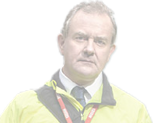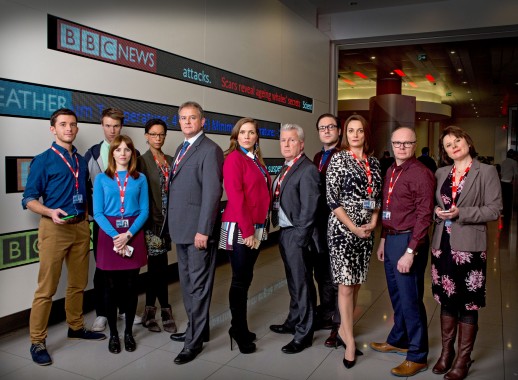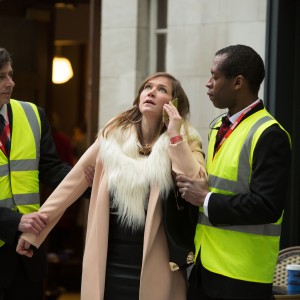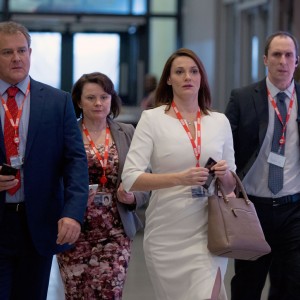Article by James Rampton for The Independent
The BBC newsroom now use Siobhan Sharpe’s phrase ‘Let’s nail this puppy to the floor!’ in a true case of life imitating art.
Hugh Bonneville can scarcely contain his delight. We’re sitting near a hot-desking area in the BBC’s New Broadcasting House. It is sign-posted “Albert Square” and surrounded by fake wrought iron railings and hedges. Overhead hangs a pub sign reading “Queen Vic.” It’s like one of the ridiculous sets you see on W1A, the delicious sitcom about BBC bureaucracy – except it’s for real.
“‘Albert Square’ is unbelievable and hilarious, isn’t it?” laughs Bonneville, who plays Ian Fletcher, the BBC’s Head of Values in the BBC2 comedy, which returns for a second series on Thursday 23 April. “We’ve had to tone down reality for the purposes of W1A.”
The thing about John Morton’s show is that, like its predecessor, Twenty Twelve, about the (fictional) Olympic Delivery Committee headed by Fletcher, it is close enough to the real thing to be completely believable.
W1A’s buffoonery of BBC execs (is that the right collective noun?) use language and behaviour that is laughable, but that nevertheless resides on the borderline of plausibility. So when PR consultant Siobhan Sharpe (a brilliant performance by Jessica Hynes) tells a roomful of bored-looking managers, “What we do is either nut up here or get off the bus at Losers’ Creek,” you can all too easily imagine it being said in real life.
The cast’s experience has certainly seen reality and fiction start to merge. Hynes tells me: “Frank Gardner, the BBC’s security correspondent, came up to me when we were shooting in New Broadcasting House the other day and told me that in the BBC newsroom they still use a phrase of Siobhan’s from the last series: ‘Let’s nail this puppy to the floor!’ I never expected that would happen, but now it has, it’s great.”
Bonneville, too, has been informed by BBC staffers that it is sometimes hard to distinguish fact from fantasy. “When we’ve been filming here in New Broadcasting House, a number of BBC employees have sidled up to me and said, ‘You don’t know the half of it…’
“The same was true when we were making Twenty Twelve. I met a few people involved in organising the Olympics in real life and they said to me: ‘Have you had microphones on in our office?’ John has this ability to look at a real-life situation and just nudge a little bit to the left of centre, so you can believe it could actually happen.”
Morton also possesses unusually acute antennae about what will happen in these organisations. In Twenty Twelve, he portrayed the Olympic countdown clock breaking down and an Olympic team getting lost on the way to the stadium, long before those incidents took place in real life.
Now, in the second series of W1A, the writer-director has displayed similar prescience about Jeremy Clarkson. In the show, which was written several months before the BBC pressed the ejector-seat button on the Top Gear presenter, Clarkson is invariably the first item on the agenda of Ian’s regular Damage Limitation Meetings.
Looking out on “Have I Got Mews” (I kid you not), Bonneville observes: “John has this uncanny ability to, if not predict events, to get into the right ballpark. For instance, Jeremy Clarkson has presented the BBC over the years with many learning opportunities, and it’s great for a character like Ian Fletcher, who is Head of Values, to be able to ‘value those values.’”
In another storyline from next week’s opening episode, Ian and his team get caught up in a tangled web as they run through the security protocol before a Royal visit.
“John is very clever at ratcheting up the idiocy,” Bonneville continues, in a break between scenes in which Ian is once again struggling with his foldaway bike. “In this episode, all sorts of wonderful BBC security procedures are in place for the visit of HRH. What could possibly go wrong?”
In the new series, Siobhan also takes the opportunity to rebrand Wimbledon in typically ludicrous fashion. The PR guru is many people’s favourite character. “Siobhan is fatally self-deluded,” says Hynes. “People have told me that she’s a recognisable character from their lives and that they’re irritated by people like Siobhan on a daily basis. So to see her on TV and be able to laugh at her and feel superior to her is brilliant.”
One of the joys of the show is that it highlights the propensity of executives to use jargon to cloak rather than illuminate meaning.
“Characters in this show employ language to obfuscate,” says Bonneville. “They say ‘Yes’ when they mean the opposite and have that look in their eye which says, ‘If I keep talking for long enough, someone will eventually believe me’.”
Paul Schlesinger, the producer of W1A, agrees. “Take Simon Harwood, the BBC’s Director of Strategic Governance. He never actually says anything. All he says is: ‘You’ll know better than me what you want to do about this’. In that way, he can then take credit for things he didn’t do and dump the blame for failures on junior colleagues. That sort of office politics is universal.”
It is true that W1A chimes with audiences because its portrayal of the lunacy of office life is relatable; it is not about the BBC.
“A number of people have said to me, you should have been at my board meeting, or my church hall meeting, or my parish town hall meeting and so on,” says Bonneville. “Really, that culture is what John is skewering. This incarnation happens to be at the BBC, but I think a lot of viewers recognise it, and it’s hopefully not just an in-joke for people who work in the media.”
For all the mickey-taking, the makers of W1A believe that their show is an affectionate portrait of the BBC. “I do feel a swell of pride when I come to New Broadcasting House and get my pass stamped, ‘Staff’,” says Hynes. “Maybe it’s because I’ve never had a proper job. For all its foibles, the BBC is one of the last great British institutions that still serves our country – unlike the government. It’s a place where ideals and values are still on the agenda. They no longer exist anywhere else in the corporate realm because money and power are the kings.”
Bonneville argues that the BBC is courageous to have commissioned W1A at all. “I do think it’s brave of the BBC to make this. What other broadcasting organisation would screen this without any editorial interference? I can’t imagine Fox doing it.
“I’ll defend the BBC to my dying day. Public service broadcasting is an essential part of our society. The BBC bends over backwards to be impartial, but unfortunately in doing so it often beats itself with a stick. I think it’s a fantastic organisation, but it does lampoon itself on a daily basis.”
Ian, Siobhan and the rest of the gang are such compelling characters, it would be, to borrow Simon’s catchphrase, “very strong” to see them in another new context whenever W1A comes to an end. So where would Bonneville like to see them go next, once they have sorted out the BBC?
“I think they should go and knock the armed forces into shape, or perhaps the NHS,” the actor smiles.
Whatever they do, Ian, Siobhan and the team will surely nail that puppy to the floor.
‘W1A’ starts on 23 April at 9pm on BBC2











